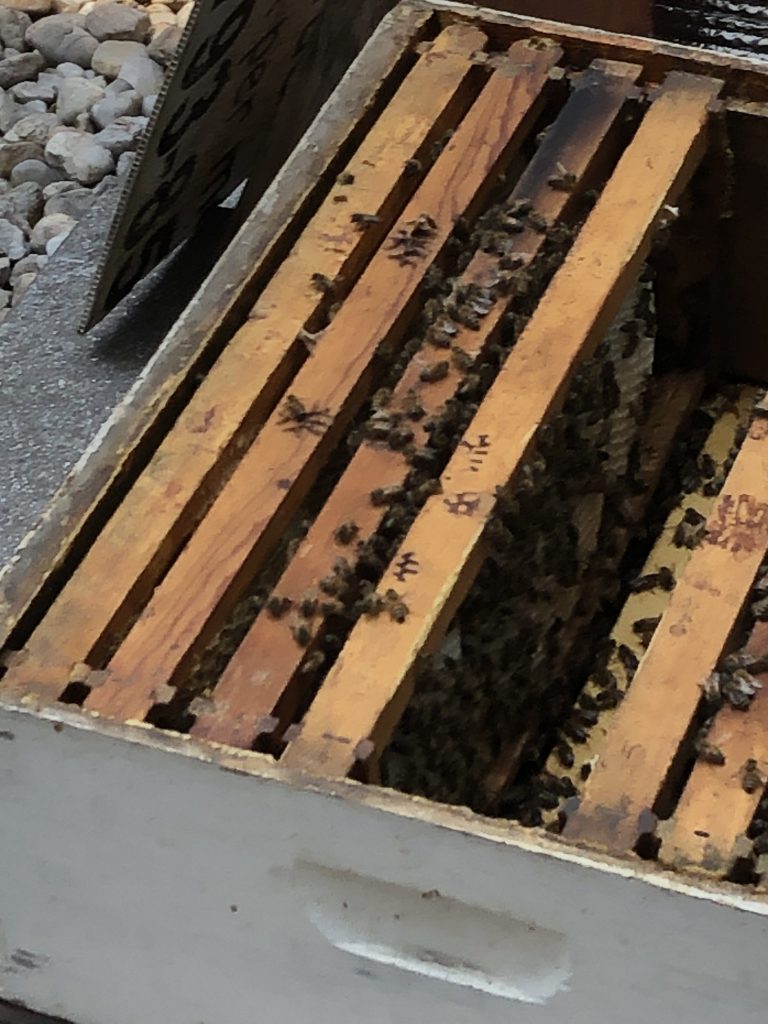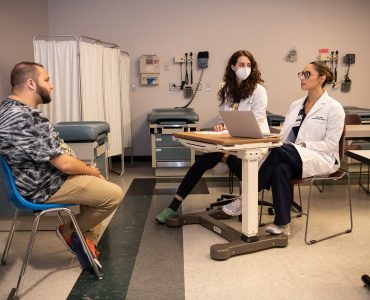What is all the buzz about on the seventh-floor green roof of the University of Maryland, Baltimore’s (UMB) Health Sciences Research Facility III (HSRFIII)?

Honeybees will soon be busy making honey in hives on the roof. The UMB Office of Sustainability is working with Baltimore’s Bee Friendly Apiary to install the hives this spring as part of efforts to make the campus more hospitable to a variety of pollinators through ecological landscaping projects.
In addition to producing honey, bees contribute significantly to our ecosystems. As pollinators, bees play an important role in our agricultural industry; without them, many of our crops would falter and die. Without bees, our springs would also be a lot less colorful and bright, as approximately 80 percent of flowering plants depend on bees for their pollination. By providing urban hives, UMB is helping to protect bees from pests, habitat loss, and other threats they face.
“A world without bees would be sad indeed,” says Anthony Consoli, university architect, who has been advocating for the integration of more pollinator-friendly plants in landscaping projects across campus. “Suddenly the following would all disappear: apples, coffee, almonds, cocoa, avocados, cherries, strawberries, blueberries, and most nuts. All of us need to do so much more to protect these miracle workers of nature so very instrumental to our own health and nutrition.”
Thousands of Bees
While thinking of beehives typically conjures up images of rural, grassy patches, honeybees can thrive in an urban setting. Due to the urban heat island effect, cities offer warmer temperatures and superior wind protection compared to their rural counterparts. Additionally, bees are typically exposed to fewer pesticides in urban areas than in their more agriculture-heavy surroundings.
The hives at HSRFIII will complement existing hives at the University of Maryland Medical Center (UMMC) downtown and midtown campuses. Local beekeeper Bill Castro, owner of Bee Friendly Apiary, maintains the hives at UMMC and will also be caring for the hives on UMB’s campus to ensure they stay healthy throughout the seasons.
UMB will have a single colony to start, consisting of about 10,000 to 20,000 worker bees, one queen, and several hundred males. While the hives’ location on a green roof may provide them with some nectar, the bees will mostly be traveling beyond the roof to more heavily flowering plants nearby to forage. Since bees can travel up to 5 miles to gather pollen and nectar, UMB’s downtown hives can aid in pollination throughout Baltimore City.
Helping the Colony Expand
Castro’s Bee Friendly Apiary is a Baltimore-based organization committed to raising healthy bees and promoting the vitality and expansion of the natural bee population. Castro specializes in live honeybee structural and swarm removals to ensure the survival of colonies, relocating them to private properties and parks within the Baltimore area where they can thrive. In terms of maintenance and care of the UMB hives, Castro’s role is helping the colony expand.
“My job is to provide the growing colony the room it needs by adding or removing boxes so they can grow and store honey for times when flowers are unavailable,” he says.
The beehives will be visible from two vantage points behind glass within HSRFIII to passers-by hoping for a glimpse of the bees hard at work, making honey. The honey produced at this site will not be harvested for human consumption. Instead, the bees will get to keep all of the honey they produce to keep themselves nourished, to benefit from antimicrobial properties, to aid faster wound healing, and for improved cold tolerance during the winter months.
While concerns are often shared regarding the aggression of bees and their tendency to sting humans, pollinator bees are busy collecting pollen and nectar and are not looking to sting humans. As long as you do not disturb them, they will not have a reason to act defensively.



